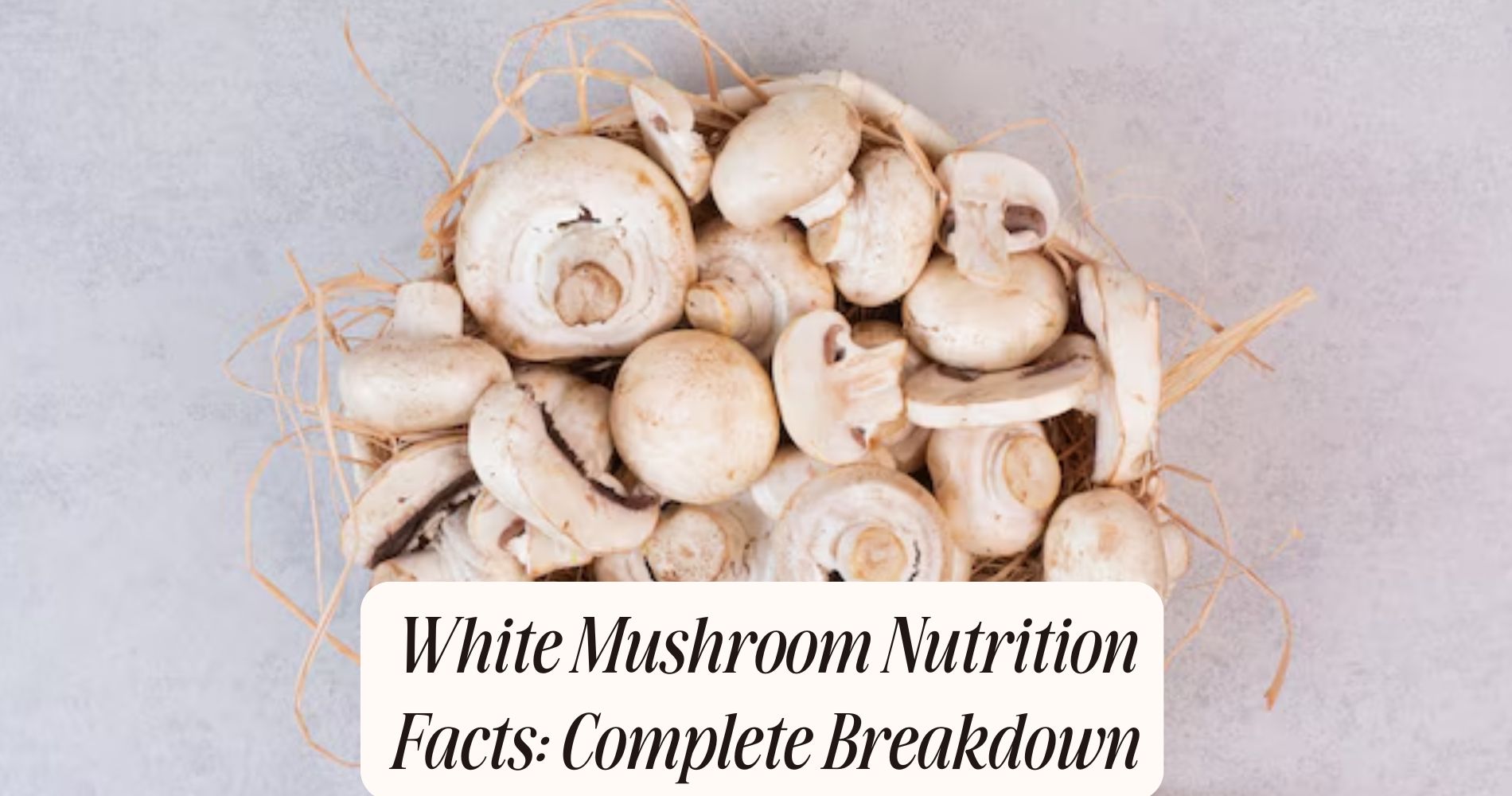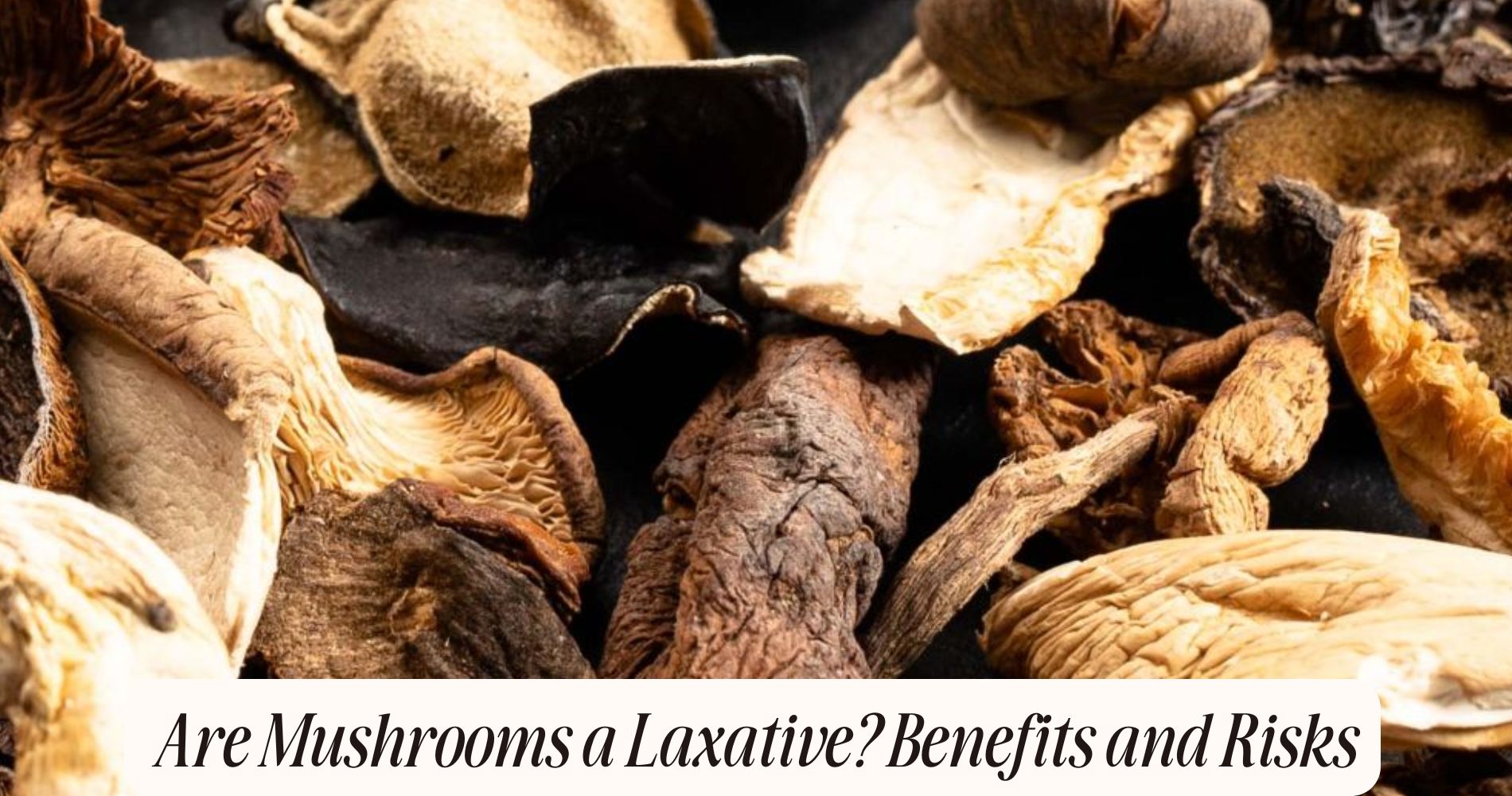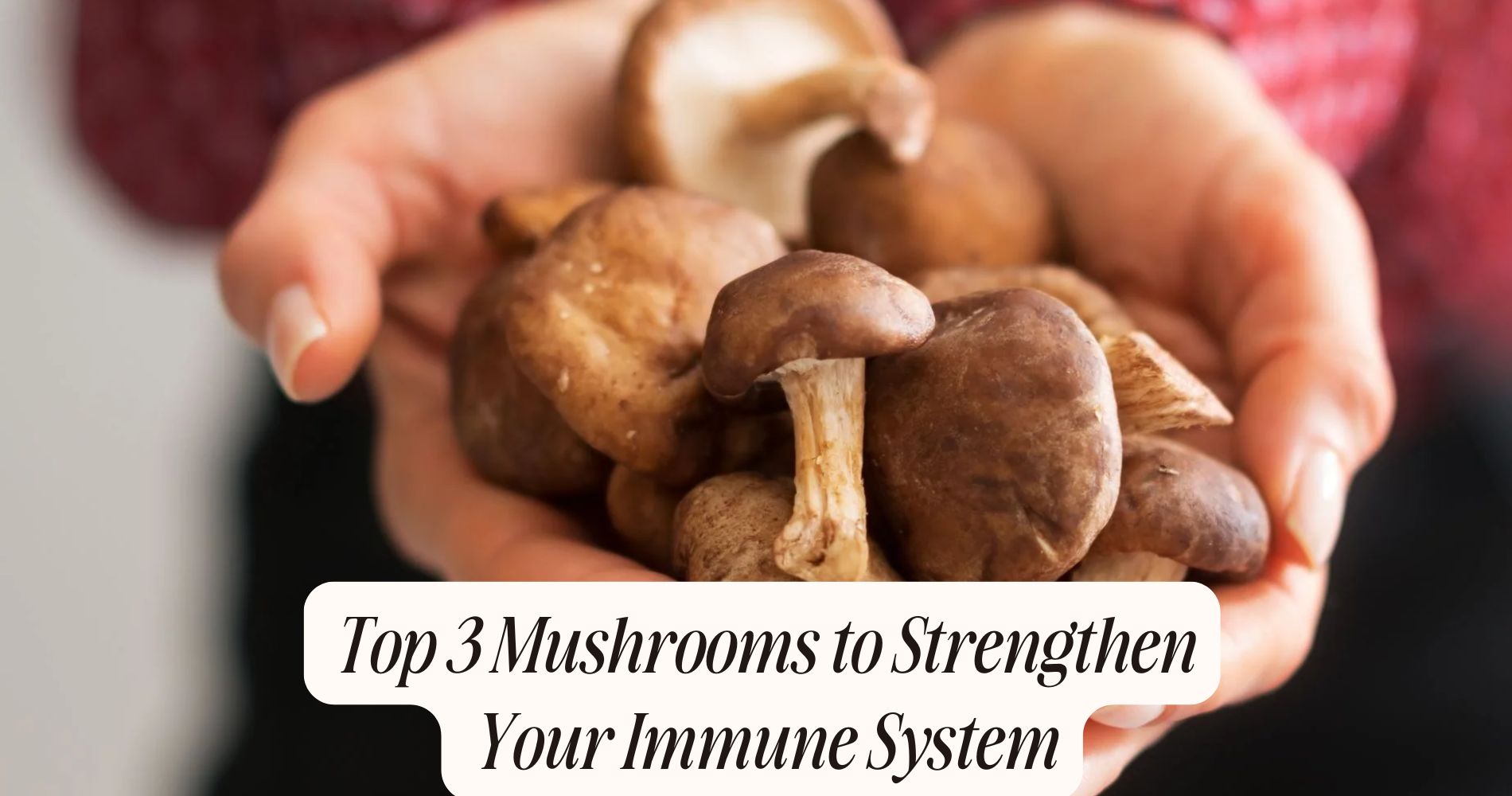
White Mushroom Nutrition Facts: Complete Breakdown
Nutritional Overview
Nourishing your body with white mushrooms can offer a delightful blend of taste and health benefits. These versatile fungi are low in calories yet rich in essential nutrients, making them an excellent choice for various diets.
You can use different cooking techniques to enhance their natural flavor profiles, whether you're sautéing, grilling, or roasting.

White mushrooms have a mild, slightly sweet taste that pairs well with numerous ingredients. When you sauté them in olive oil or butter, you'll intensify their umami flavor, making them a perfect addition to stir-fries and pasta dishes.
Grilling adds a smoky note, while roasting can bring out a deeper richness that complements meats and vegetables alike.
Incorporating white mushrooms into your meals is simple. You can toss them into soups for added texture, blend them into sauces for depth, or use them as a topping on pizzas.
Their adaptability not only enhances your dishes but also contributes to a more balanced diet. By experimenting with different cooking techniques, you can discover how white mushrooms can transform your meals into flavorful, nutritious experiences.
Vitamin Content
White mushrooms are packed with essential vitamins like B vitamins, which play a vital role in energy metabolism and overall health.
Understanding their vitamin content can help you appreciate the significant health benefits these mushrooms offer, such as supporting immune function and reducing inflammation.
Essential Vitamins Overview
When considering your dietary choices, it's important to recognize the essential vitamins found in white mushrooms. These fungi are a good source of several key vitamins, particularly B vitamins. For instance, they provide riboflavin (B2), niacin (B3), and pantothenic acid (B5), all of which play important roles in energy metabolism and overall health.
Riboflavin is critical for converting carbohydrates into energy, while niacin supports your nervous and digestive systems. Pantothenic acid is necessary for synthesizing coenzyme A, essential for fatty acid metabolism.
Additionally, white mushrooms contain small amounts of vitamin D, especially when exposed to sunlight, which is significant for bone health and immune function.
The cooking methods you choose can affect the vitamin retention in these mushrooms. Sautéing or grilling can enhance their flavor profile while preserving most of their nutritional content. On the other hand, boiling may lead to a loss of water-soluble vitamins.
Incorporating white mushrooms into your meals can greatly boost your vitamin intake, contributing to a balanced diet that supports your overall well-being.
Health Benefits Explained
Including white mushrooms in your diet offers multiple health benefits, largely due to their rich vitamin content. These mushrooms are a fantastic source of B vitamins, particularly riboflavin, niacin, and pantothenic acid, all of which play essential roles in energy metabolism. Consuming white mushrooms can help you feel more energetic and support your body's overall metabolic functions.
Additionally, their high vitamin D content is important for immune support. Vitamin D helps modulate your immune system, ensuring your body can effectively fight off illnesses. A strong immune system is critical for overall health, especially during cold and flu seasons.

If you're focused on weight management, white mushrooms can be a great addition to your meals. Low in calories yet high in essential nutrients, they can help you feel satisfied without adding extra calories. Their fiber content may also promote satiety, making it easier for you to manage your weight effectively.
Incorporating white mushrooms into your meals can provide significant health benefits, thanks to their impressive vitamin profile that supports both immune function and weight management.
Daily Value Comparisons
Understanding the vitamin content of white mushrooms can help you make informed dietary choices. These mushrooms are low in calories but rich in essential nutrients, which can greatly contribute to your daily intake. For instance, a one-cup serving provides about 17% of your daily value for riboflavin (Vitamin B2) and 14% for niacin (Vitamin B3).
These B vitamins play an important role in energy metabolism and nutrient absorption, ensuring that your body effectively utilizes the food you consume.
Moreover, white mushrooms contain a decent amount of selenium, providing approximately 20% of your daily intake. Selenium is a powerful antioxidant that supports your immune system and helps to protect your cells from damage.
They also offer a small amount of Vitamin D when exposed to sunlight, which is vital for bone health and immune function.
Including white mushrooms in your diet not only boosts your nutrient absorption but also enhances your overall health. By understanding their vitamin content, you can strategically incorporate them into meals, ensuring you're meeting your nutritional needs while enjoying a flavorful addition to your diet.
Mineral Profile
White mushrooms are a rich source of essential minerals that play vital roles in your overall health.
These minerals, including potassium, phosphorus, and selenium, contribute to various bodily functions, from bone health to immune support.
Understanding their benefits can help you make informed dietary choices to enhance your well-being.
Essential Minerals Overview
Mushrooms, particularly white mushrooms, aren't just flavorful additions to meals; they also pack a punch when it comes to essential minerals. These mushrooms are a rich source of minerals like selenium, potassium, and phosphorus, which play important roles in your body. Selenium acts as an antioxidant, helping to protect your cells from damage, while potassium supports heart health and fluid balance. Phosphorus is essential for bone health and energy production.
When you consume white mushrooms, you're not only getting these essential minerals, but also enhancing mineral absorption in your diet. The fiber content in mushrooms can aid digestive health, which is necessary for the effective absorption of minerals.
Moreover, mineral interactions are important to take into account. For instance, the presence of potassium can enhance calcium absorption, making white mushrooms a smart choice for supporting bone density.
Incorporating white mushrooms into your meals can help you meet your mineral needs while enjoying their savory taste. Whether sautéed, grilled, or added to soups, these mushrooms offer a nutrient-dense option that complements a healthy diet.
Health Benefits Explained
When you include white mushrooms in your diet, you're not just enjoying their taste; you're also reaping a myriad of health benefits thanks to their impressive mineral profile.
These mushrooms are rich in essential minerals like selenium and potassium, both of which play critical roles in your overall health.
Selenium is a powerful antioxidant that supports your immune system, helping your body fend off illnesses and infections. Research indicates that adequate selenium intake can enhance immune function, making it a crucial mineral for maintaining your health.
Additionally, potassium is essential for regulating blood pressure and fluid balance, which can contribute to overall cardiovascular health.
Incorporating white mushrooms into your meals can also support weight management. They're low in calories yet high in fiber, which can keep you feeling full longer, reducing the urge to snack on unhealthy options.
The combination of their low-calorie content and high nutrient density makes them an ideal choice for those looking to maintain a healthy weight without sacrificing flavor.
Caloric Value
A single cup of raw white mushrooms contains approximately 15 calories, making them an incredibly low-calorie food option. This caloric breakdown highlights why they're a popular choice for those looking to maintain or lose weight.
With such a minimal caloric content, you can easily incorporate them into various dishes without worrying about greatly increasing your overall calorie intake.
When considering portion sizes, one cup is a standard measurement for many recipes. However, you can enjoy white mushrooms in larger quantities, as eating two cups only adds about 30 calories to your meal.

This makes them an ideal filler in salads, stir-fries, or soups, allowing you to create more satisfying meals without the extra calories.
In addition to being low in calories, white mushrooms provide essential nutrients, including vitamins and minerals. They're often included in diets aimed at lowering caloric consumption while still providing necessary nutrients.
Health Benefits
Packed with essential nutrients, white mushrooms offer a range of health benefits that can enhance your overall well-being. These mushrooms are low in calories but high in important vitamins and minerals, making them an excellent addition to your diet for weight management.
They're especially rich in B vitamins, which help convert food into energy, supporting a healthy metabolism.
Moreover, white mushrooms contain beta-glucans and other polysaccharides, known to promote immune support. Research indicates that these compounds can stimulate the activity of immune cells, helping your body fend off infections and illnesses. By incorporating white mushrooms into your meals, you can boost your body's defenses while enjoying a flavorful ingredient.
Additionally, their high fiber content aids in digestion, promoting a healthy gut. This supports overall health and can contribute to weight management by keeping you full longer, reducing the likelihood of overeating.
Culinary Uses
Incorporating white mushrooms into your cooking can elevate the flavor and nutritional profile of various dishes. These versatile fungi work well with a wide array of cooking techniques, whether you're sautéing, grilling, or roasting. Their mild, earthy flavor complements a variety of ingredients, making them a fantastic addition to soups, stir-fries, and pasta dishes.
When it comes to flavor pairings, white mushrooms shine alongside garlic, onions, and herbs like thyme or parsley. You can enhance their taste by adding a splash of white wine or a drizzle of balsamic vinegar during cooking, which brings out their natural umami richness.
For a hearty meal, consider adding them to risottos or grain bowls, where they can absorb and enhance the flavors of the dish.
Don't forget that white mushrooms also work beautifully in vegetarian and vegan recipes, providing a satisfying texture and depth of flavor that can help create a well-rounded meal.
Frequently Asked Questions
Are White Mushrooms Safe for People With Allergies?
If you have white mushroom allergies, consuming them can trigger allergic reactions. It's essential to consult a healthcare professional for personalized advice, as symptoms can vary greatly among individuals. Always prioritize your safety regarding food allergies.
How Should White Mushrooms Be Stored for Freshness?
To keep white mushrooms fresh, store them in a paper bag in the fridge. This method allows for air circulation, extending freshness duration. Avoid plastic bags; they trap moisture, causing mushrooms to spoil faster.
Can White Mushrooms Be Eaten Raw?
Yes, you can eat white mushrooms raw. They offer health benefits, including antioxidants, and add a crunchy texture to salads. Their mild flavor enhances culinary uses, making them a versatile ingredient in various dishes. Enjoy them fresh!
What Are the Best Cooking Methods for White Mushrooms?
When cooking white mushrooms, try sautéeing for a quick, flavorful result. Use high heat and butter for rich taste. Grilling's great, too; just brush with oil and season for a smoky, delicious finish.
Do White Mushrooms Contain Any Toxins?
While white mushrooms generally have low toxicity levels, proper mushroom identification is essential. Certain wild mushrooms can be toxic, so always make certain you're consuming cultivated varieties or correctly identified wild species to avoid any health risks.
Conclusion
Incorporating white mushrooms into your diet offers a wealth of nutritional benefits, from their low calorie count to their rich vitamin and mineral content. They're not just a tasty addition to meals but also support your overall health with antioxidants and immune-boosting properties. Whether you sauté, grill, or add them to soups, you'll enhance both flavor and nutrition. So go ahead, enjoy white mushrooms regularly, and reap the rewards of their impressive health benefits.




